Is It Good to Fish in the Rain Saltwater
Fishing in the rain in saltwater environments sparks a debate amongst seasoned anglers and recreational fishermen alike. Some argue that the rainfall can stimulate feeding activity, citing the reduced light conditions and influx of nutrients into the water as contributing factors.
Conversely, others maintain that heavy rain can disturb the natural habitats, leading to reduced catch rates. The question remains: is fishing in the rain truly beneficial or does it just complicate the task at hand?
Join us as we explore this discussion further, examining both the scientific and anecdotal evidence at our disposal.
Key Takeaways
- Rain can affect saltwater clarity and salinity, influencing fish visibility, behavior, and habitats.
- Post-rain conditions can stimulate fish feeding activity and provide cover, enhancing fishing opportunities.
- Altered salinity and increased turbidity post-rain can disrupt fish feeding patterns and migration routes.
- Quality rain gear and consideration of safety measures are crucial for successful and comfortable fishing in the rain.
Understanding Rain’s Impact on Fishing
To fully grasp the intricacies of saltwater fishing, one must understand the profound impact rain can have on this activity. Rain can affect the clarity of saltwater, muddying it up and potentially turning off fish bite due to decreased visibility. This is a critical factor that anglers must be cognizant of when planning their fishing trips.
Further, the wind direction accompanying rain plays a consequential role in determining saltwater fishing conditions. Different wind directions can either stir up or calm the waters, affecting the fish’s movements and feeding patterns. The volume of rain is also a determinant. Heavy rain, particularly upstream, can alter the salinity levels in bays, making them less hospitable for certain fish species.
Moreover, rain may lower water temperatures in saltwater areas, leading to changes in fish behavior. Understanding these influences is essential for successful fishing outcomes. The more aware an angler is of the dynamic interaction between rain and saltwater fishing, the more likely they are to adapt their strategies and continue to feel a sense of belonging within the fishing community, regardless of the weather conditions.
Advantages of Post-Storm Fishing
While the impact of rain on saltwater fishing is complex, it’s noteworthy that the post-storm period can actually present a number of unique advantages for anglers. In the aftermath of a storm, the water dynamics change significantly, creating conditions that can be advantageous for those aiming to catch fish.
Here are some advantages to consider:
- Post-storm can trigger fish feeding activity, creating a prime opportunity for anglers to maximize their catches. The turbulence churns up food, attracting fish to the surface.
- The water temperature can decrease while oxygen levels increase. These changes can invigorate fish, making them more active and easier to catch.
- Freshwater runoff attracts baitfish, leading to feeding frenzies that increase fish activity.
- Muddy water offers coverage for fish from predators, improving their visibility of lures or bait.
In short, the post-storm period in saltwater environments can enhance the opportunity to catch fish. Embracing these changes, rather than viewing them as obstacles, can enrich the angler’s experience. Remember, every cloud (or storm) can indeed have a silver lining.
Disadvantages of Post-Rain Fishing

Despite the potential allure of post-rain fishing, there are notable drawbacks that can impact the experience and success rate. Specifically, changes in salinity levels and increased water turbidity can significantly affect the behavior and distribution of fish.
Additionally, these conditions may increase predation risks, further complicating the fishing endeavor.
Altered Salinity Levels
Heavy rainfall significantly alters the salinity levels in saltwater, potentially disrupting the natural balance of the ecosystem and negatively impacting fishing activities. The introduction of fresh water can dilute the saltiness of the ocean, causing certain species to become less active or even displaced.
This can affect fishing in several ways:
- Freshwater runoff dilutes saltwater, unbalancing the ecosystem.
- Alterations in salinity can disrupt the feeding patterns of fish.
- Post-rain salinity changes might affect fish migration routes.
- Fish may avoid areas with drastically changed salinity levels, affecting fishing success.
Understanding these shifts can help us adapt our fishing techniques post-rain, ensuring we continue to enjoy our connection with the sea and its plentiful bounty.
Increased Water Turbidity
In addition to altering salinity levels, post-rain conditions can greatly increase water turbidity in saltwater environments, presenting a unique set of challenges for fishing enthusiasts. As the water becomes clouded due to suspended particles, visibility is significantly reduced. This can make it much harder for fish to locate your bait, thus making it more challenging to attract fish.
High turbidity can also cause fish to become more cautious and selective in feeding. This alters their natural behavior and may disrupt their typical feeding patterns, which can adversely affect the success of your fishing endeavors. Thus, increased water turbidity following rain is a significant consideration when deciding whether to fish in saltwater environments during or after rainfall.
Potential Predation Risks
Another significant disadvantage of post-rain saltwater fishing pertains to the potential increase in predation risks, as predators may become more active and aggressive in their search for food. This heightened risk is due to several factors:
- Predatory fish may become more opportunistic, posing a challenge for anglers.
- Muddy water decreases visibility, causing fish to rely more on their predatory instincts.
- Increased water flow and changes in salinity can disrupt fish behavior, making them more vulnerable.
- Anglers may need to be more aware of their surroundings due to these altered environmental conditions.
Understanding these predation risks is essential for saltwater anglers, especially after a rain event. This knowledge can help guide their strategies and ensure a safer and more successful fishing experience.
Fishing Preceding a Rainfall

Fishing prior to a rainfall can be remarkably productive, as saltwater fish tend to feed more actively before an impending storm. The changing barometric pressure stimulates this intensified activity, resulting in increased responsiveness to bait or lures. This pre-rain fervor makes it an opportune time for anglers to experience increased catch rates, ensuring a successful fishing trip in saltwater environments.
The following table illustrates the correlation between pre-rain conditions and fish behavior:
| Condition | Fish Behavior | Impact on Fishing |
|---|---|---|
| Pre-rainfall | Increased feeding activity | Higher catch rates |
| Changing barometric pressure | More aggressive responses | Improved success with bait/lures |
| Approaching storm | Heightened activity | Enhanced fishing experience |
| Increased cloud cover | More fish near the surface | Increased visibility of fish |
| Cooling water temperature | Greater fish movement | Expanded fishing opportunities |
Rainfall and Fish Behavior
As rainfall begins to pour, it can dramatically alter the water temperature and consequently, the activity of fish in saltwater environments. This change can result in distinct behavioral changes among various fish species. Some may become more active, making them more likely to feed and thus, easier to catch. Also, rain can wash nutrients into the water, attracting both baitfish and predators, making saltwater areas ripe for fishing.
It is important to understand and anticipate these changes to strategize for successful saltwater fishing trips. Here are some practical implications and considerations of rainfall on fish behavior:
- Lowered water temperatures can make certain species more active and willing to bite.
- Nutrient influx can lead to baitfish concentration, drawing in predatory fish.
- Adjustments to bait presentation and fishing techniques may be necessary in rain conditions.
- Understanding species-specific responses to rain can improve fishing success.
In essence, rain significantly influences fish behavior. Recognizing this interconnectedness between rainfall and fish activity can create a sense of belonging and unity with the natural world. Therefore, fishing in the rain, when done correctly, can indeed be a fruitful saltwater experience.
Drawbacks of Rainy Weather Fishing

Despite the potential benefits of fishing during rainfall, there are several notable drawbacks that anglers must be aware of, particularly when fishing in saltwater environments. Rain can muddy up the water, reducing visibility and potentially turning off the fish bite. This becomes more pronounced during heavy rain, leading to dirty water conditions, making it challenging to attract fish.
Moreover, rainy weather can create rough surf conditions, making it dangerous to fish in open waters. In saltwater, rain can dilute the salinity levels and negatively impact fish behavior. Besides these challenges, fishing in the rain can be uncomfortable, increasing the risk of hypothermia.
To summarize, here is a table outlining the drawbacks of rainy weather fishing:
| Drawback | Explanation |
|---|---|
| Muddied Water | Rain, especially heavy rain, can make the water dirty, reducing visibility and fish bite. |
| Rough Surf | Rain can create dangerous surf conditions in open waters. |
| Diluted Salinity | In saltwater, rain can dilute the salinity levels, affecting fish behavior. |
| Discomfort | Rain can make fishing uncomfortable and increase the risk of hypothermia. |
| Impact on Fish Behavior | The change in water conditions due to rain can negatively impact fish behavior. |
Benefits of Rainy Day Fishing
Contrary to common perception, rainy day fishing in saltwater environments can offer several unique advantages, potentially leading to a fruitful angling experience. There are numerous benefits to fishing during rain, including:
- Increased fish activity: As water is often stirred up by the rain, fish become more active in search of food.
- Nutrient-rich waters: Rain washes nutrients and prey into the water, creating a feeding frenzy.
- Natural cover: Overcast skies and rain can provide an excellent camouflage for sight fishing, allowing anglers to approach without detection.
- Less competition: Rainy conditions can deter other anglers, giving you unimpeded access to prime fishing spots.
These benefits can significantly enhance your angling experience. The advantage of sight fishing during rain is particularly noteworthy as the natural cover allows you to get closer to the fish without being seen. However, it’s essential to remember that while the water is often more energized during rain, safety should always be your paramount consideration.
Surf Fishing Conditions During Rain

In the realm of surf fishing, inclement weather conditions, particularly rain, play a crucial role in determining the success of the activity.
The rain not only impacts the visibility and behavior of the fish but also necessitates the use of specific gear tailored for these conditions.
This discussion will explore these facets, focusing on how rain influences fish and the appropriate gear for rainy surf fishing.
Rain’s Impact on Fish
The impact of rain on surf fishing conditions is multifaceted. Precipitation can muddle the saltwater, reduce visibility, and affect fish behavior. This leads us to question: Is rain good or bad for fishing? Here are the pros and cons:
- Rain can create murky waters, reducing fish visibility and potentially decreasing bites.
- It can offer coverage for fish from predators, increasing their activity and potential catches.
- Lower visibility may prompt reactive bites from fish unable to clearly see the lure.
- Rain can stir up bait, creating feeding frenzies but also altering fish behavior.
Understanding these impacts fosters a sense of belonging among fishing enthusiasts. We share the joy and challenges of surf fishing in the rain.
Gear for Rainy Fishing
Equipping oneself with the right gear can significantly improve the experience of surf fishing under rainy conditions. Quality raingear is a non-negotiable for comfort and protection.
Waterproof gear, such as bags or cases, are crucial to safeguard essential items from water damage. Non-slip waterproof boots provide traction, preventing slipping on wet surfaces, a common hazard during both freshwater and saltwater fishing.
A waterproof hat with a brim helps keep rain out of your eyes, improving visibility, and quick-drying clothing made of synthetic materials can ensure comfort and dryness. These pieces of gear not only enhance your fishing experience but also create a sense of belonging, as they demonstrate a dedication to the sport, regardless of weather conditions.
Frequently Asked Questions
Does Rain Affect Saltwater Fish?
Yes, rain significantly impacts saltwater fish, altering aquatic ecosystems and influencing fish behavior. Changes in salinity, temperature, and oxygen levels can affect fish feeding patterns and their overall activity in the saltwater environment.
Do Fish Bite in the Ocean When It’s Raining?
Rain impacts on bait and stormy weather fishing can be unpredictable. However, as the adage goes, “fish bite the least when the wind is from the east”, implying that they might be more active during rainfall.
Is It Worth Fishing in the Rain?
Fishing in the rain can indeed be fruitful. Weather patterns influence fish behavior positively. Rain gear suitability, however, is crucial for a comfortable, successful experience. So, despite challenges, it’s worth considering.
What Fish Bite in the Rain?
Rainy weather can stimulate certain fish species to feed more actively. Notably, redfish, trout, and flounder respond positively to rainy weather baits. The weather impact on these species makes them more likely to bite in rainy conditions.
Conclusion
In conclusion, rain can significantly influence saltwater fishing outcomes, both positively and negatively. It’s crucial for anglers to understand these impacts and adapt their strategies accordingly.
While certain conditions such as increased oxygen levels and lower temperatures can enhance fishing, heavy rainfall might deter fish activity. A notable statistic is that a light rain can increase fish activity by up to 30%, emphasizing the potential benefits of fishing in the rain.



